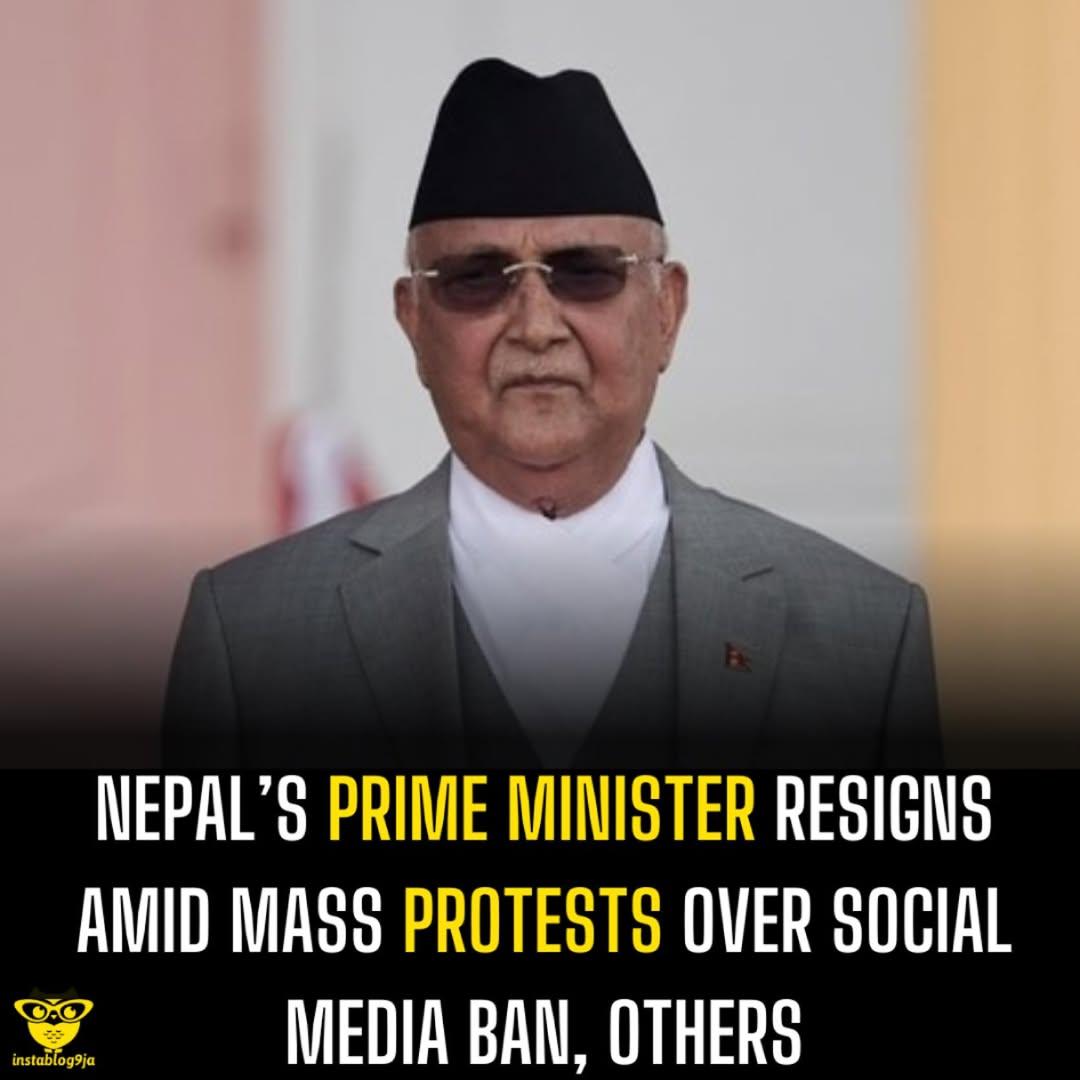Nepal’s Prime Minister Resigns Amid Mass Protests Over Social Media Ban, others.
Nepal’s Prime Minister, KP Sharma Oli, has stepped down following days of violent anti-corruption protests that left at least 19 people dead.
“The PM has quit,” Oli’s aide, Prakash Silwal, confirmed to Reuters on Tuesday. In his resignation letter to President Ram Chandra Paudel, Oli said he was leaving “with immediate effect in order to take further steps towards a political solution and resolution of the problems […] taking into account the extraordinary situation currently prevailing in the country.”
The president’s office has now begun consultations to appoint a new leader, according to officials. Oli’s departure came as demonstrators defied a city-wide curfew in Kathmandu, torching politicians’ homes, clashing with riot police, and shutting down the capital. Kathmandu’s international airport was also forced to close on Tuesday afternoon amid escalating unrest.
The violence erupted after the government imposed, then lifted, a ban on social media platforms including Facebook, X, and YouTube. Authorities said the block was triggered by non-compliance with new regulations, but it quickly fueled anger among young Nepalis already frustrated by corruption, poor governance, and limited economic opportunities.
Protesters stormed streets near parliament on Monday, where police responded with tear gas and rubber bullets. By Tuesday, the clashes had spread across the capital, with demonstrators burning tyres, throwing stones, and chasing security officers.
Homes belonging to senior political figures, including President Paudel and opposition leader Sher Bahadur Deuba, were also targeted. Local media reported that several ministers had to be evacuated by military helicopters.
Nepal has endured political instability and economic hardship since the monarchy was abolished in 2008. Before resigning, Oli convened a cross-party meeting, warning that violence was not in the nation’s interest and urging for “peaceful dialogue to find solutions.”
Nepal’s Prime Minister, KP Sharma Oli, has stepped down following days of violent anti-corruption protests that left at least 19 people dead.
“The PM has quit,” Oli’s aide, Prakash Silwal, confirmed to Reuters on Tuesday. In his resignation letter to President Ram Chandra Paudel, Oli said he was leaving “with immediate effect in order to take further steps towards a political solution and resolution of the problems […] taking into account the extraordinary situation currently prevailing in the country.”
The president’s office has now begun consultations to appoint a new leader, according to officials. Oli’s departure came as demonstrators defied a city-wide curfew in Kathmandu, torching politicians’ homes, clashing with riot police, and shutting down the capital. Kathmandu’s international airport was also forced to close on Tuesday afternoon amid escalating unrest.
The violence erupted after the government imposed, then lifted, a ban on social media platforms including Facebook, X, and YouTube. Authorities said the block was triggered by non-compliance with new regulations, but it quickly fueled anger among young Nepalis already frustrated by corruption, poor governance, and limited economic opportunities.
Protesters stormed streets near parliament on Monday, where police responded with tear gas and rubber bullets. By Tuesday, the clashes had spread across the capital, with demonstrators burning tyres, throwing stones, and chasing security officers.
Homes belonging to senior political figures, including President Paudel and opposition leader Sher Bahadur Deuba, were also targeted. Local media reported that several ministers had to be evacuated by military helicopters.
Nepal has endured political instability and economic hardship since the monarchy was abolished in 2008. Before resigning, Oli convened a cross-party meeting, warning that violence was not in the nation’s interest and urging for “peaceful dialogue to find solutions.”
Nepal’s Prime Minister Resigns Amid Mass Protests Over Social Media Ban, others.
Nepal’s Prime Minister, KP Sharma Oli, has stepped down following days of violent anti-corruption protests that left at least 19 people dead.
“The PM has quit,” Oli’s aide, Prakash Silwal, confirmed to Reuters on Tuesday. In his resignation letter to President Ram Chandra Paudel, Oli said he was leaving “with immediate effect in order to take further steps towards a political solution and resolution of the problems […] taking into account the extraordinary situation currently prevailing in the country.”
The president’s office has now begun consultations to appoint a new leader, according to officials. Oli’s departure came as demonstrators defied a city-wide curfew in Kathmandu, torching politicians’ homes, clashing with riot police, and shutting down the capital. Kathmandu’s international airport was also forced to close on Tuesday afternoon amid escalating unrest.
The violence erupted after the government imposed, then lifted, a ban on social media platforms including Facebook, X, and YouTube. Authorities said the block was triggered by non-compliance with new regulations, but it quickly fueled anger among young Nepalis already frustrated by corruption, poor governance, and limited economic opportunities.
Protesters stormed streets near parliament on Monday, where police responded with tear gas and rubber bullets. By Tuesday, the clashes had spread across the capital, with demonstrators burning tyres, throwing stones, and chasing security officers.
Homes belonging to senior political figures, including President Paudel and opposition leader Sher Bahadur Deuba, were also targeted. Local media reported that several ministers had to be evacuated by military helicopters.
Nepal has endured political instability and economic hardship since the monarchy was abolished in 2008. Before resigning, Oli convened a cross-party meeting, warning that violence was not in the nation’s interest and urging for “peaceful dialogue to find solutions.”
0 التعليقات
·0 المشاركات
·757 مشاهدة




